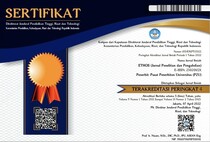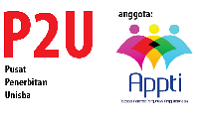Pemanfaatan Sumber Daya Alternatif Untuk Kemandirian Pangan di Kelurahan Gunung Tandala Tasikmalaya
Abstract
Abstract. The implementation of restrictions on social interaction, due to Covid-19, has caused many business sectors to experience difficulties and lay off their employees. The Indonesian Employers' Association (Apindo) noted that the number of workers who were laid off and laid off during the Covid-19 pandemic has so far reached 7 million people, this has a big impact because many people have lost their income in the midst of the food security crisis, especially for workers. Tasikmalaya City embroidery industry. The purpose of this community service program is to provide knowledge and training regarding the use of alternative resources to maintain food independence for people who have lost their jobs in the embroidery industry in Tasikmalaya City. Alternative activities given are simple urban farming and catfish cultivation in buckets. The training methods provided include providing basic knowledge and examples regarding the implementation of simple urban farming and catfish cultivation in buckets. This activity succeeded in increasing their literacy regarding the stability of food independence and understanding the potential market opportunities of this activity.
Keywords: alternative resources, urban farming, food self-sufficiency
Abstrak. Pemberlakuan pembatasan interaksi sosial akibat Covid-19 menyebabkan banyak sektor usaha mengalami kesulitan dan merumahkan karyawannya. Asosiasi Pengusaha Indonesia (Apindo) mencatat jumlah pekerja yang terkena pemutusan hubungan kerja (PHK) dan dirumahkan di tengah pandemi Covid-19 sejauh ini mencapai 7 juta orang. Hal ini berdampak besar, banyak orang kehilangan pendapatan di tengah krisis ketahanan pangan, khususnya untuk pekerja industri bordir Kota Tasikmalaya. Tujuan dari program pengabdian kepada masyarakat ini adalah memberikan pengetahuan dan pelatihan mengenai pemanfaatan sumber daya alternatif untuk menjaga kemandirian pangan pada masyarakat yang kehilangan pekerjaan di industri bordir Kota Tasikmalaya. Alternatif kegiatan yang diberikan simple urban farming dan budidaya lele dalam ember. Metode pelatihan yang diberikan mencakup pemberian pengetahuan dasar dan contoh mengenai pelaksanaan simple urban farming, serta budidaya lele dalam ember. Kegiatan ini berhasil meningkatkan literasi mereka mengenai stabilitas kemandirian pangan dan memahami peluang pasar potensial.
Kata Kunci: sumber daya alternatif, urban farming, kemandirian pangan
Keywords
Full Text:
PDFReferences
(OMS), W. H. O. (2020). COVID-19 Weekly Epidemiological Update. November, 1;4. https://www.who.int/docs/default-source/coronaviruse/situation-reports/20201012-weekly-epi-update-9.pdf
Burgui, D. 2020. Coronavirus: How action against hunger is responding to the
pandemic. Available in: https://www.actionagainsthunger.org/story/ coronavirus -how-action-against-hunger-respondingpandemic
FAO – Food and Agriculture Organization. 2020a. Q&A: COVID-19 pandemic
impact on food and agriculture. Available in: http://www.fao.org/2019- ncov/q-and-a/en/
Fournier, A. J. (2018). Direct-selling farming and urban externalities: What impact on product quality and market size? Regional Science and Urban Economics, 70, 97–111. https://doi.org/10.1016/j.regsciurbeco.2018.03.001
Kullu, P., Majeedullah, S., Pranay, P. V. S., & Yakub, B. (2020). Smart urban farming (entrepreneurship through Epics). Procedia Computer Science, 172(2019), 452–459. https://doi.org/10.1016/j.procs.2020.05.098
Rosales, G., & Mercado, W. (2020). Effect of changes in food price on the quinoa consumption and rural food security in Peru. Scientia Agropecuaria, 11(1), 83–93. https://doi.org/10.17268/sci.agropecu.2020.01.10
Siche, R. (2020). What is the impact of COVID-19 disease on agriculture? Scientia Agropecuaria, 11(1), 3–9. https://doi.org/10.17268/sci.agropecu.2020.01.00
DOI: https://doi.org/10.29313/ethos.v9i2.7150
Refbacks
- There are currently no refbacks.
Alamat Redaksi:
LPPM Unisba, Lantai 2, Jl. Purnawarman 63, Bandung 40116, Jawa Barat, (022) 4203368 , (022) 4264064. ethos.unisba@gmail.com / ethos@unisba.ac.id

This work is licensed under a Creative Commons Attribution-NonCommercial-ShareAlike 4.0 International License.














